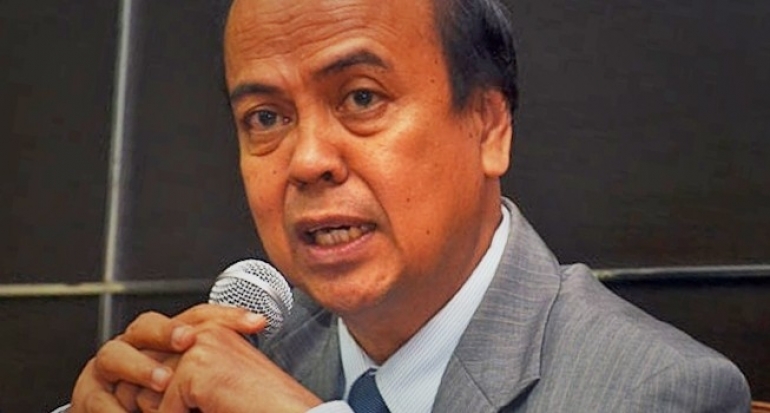
By: Hafid Abbas
(Commissioner and Chairman of Komnas HAM RI 2012-2017, President of the Global Alliance of National Human Rights Institution (GANHRI) in Southeast Asia 2014-2015)
In an interview with CNN’s Fareed Zakaria on October 25, 2015, Tony Blair, the former British Prime Minister, publicly expressed his regret and apology for the U.S. invasion of Iraq.
Blair said: “I offer my apologies for the fact that we have received false intelligence reports on allegations that Iraq has used chemical weapons extensively to attack its own population and attack others. Our guess turned out not to be true. I also apologize for the mistakes in planning, and especially for our miscalculation of what will happen after the overthrow of Saddam Hussein’s regime.”
The same thing, President Barack Obama in an interview with Fox News (04/10/2016) also expressed regret and apologies to the Libyan people. He stated that: “The United States is deeply sorry and as President, this is the biggest mistake I have made in my reign, attacking Libya and overthrowing President Muammar Gaddafi without proper planning in the aftermath of the attack. As a result Libya is absolutely kheos and continues to fall into the threat of violence by extremists.”
Shortly after the recognition of the two world leaders, from July 16 to August 4, 2016, I made a long trip to Iraq, Iran and other Middle Eastern countries. While in Iraq, I visited refugee camps, met with the UN mission, and various circles from both the government, universities and NGOs.
When meeting with human rights activists, scientists and professors at Nahrain University, the University of Baghdad, and Almustansiriyah University, my impression, slowly or quickly, they wanted to bring Blair and Obama’s open confession to international mechanisms as evidence of their conspiracy to destroy Iraq. Iraqis are not radicalized, they will only continue to fight for justice in the future.
The End of the Western Radicalism Project on Muslims
A reality that was never imagined before, on December 14, 2021, for the pioneering of Ilhan Omar, the Democratic U.S. House of Representatives has succeeded in passing the Anti-Islamophobia Act. The bill has been approved by the House and is awaiting Senate approval. Omar’s success was due to the full support of all ranks of the Democratic Party, including President Biden.
Under the Anti-Islamaphobia Act, the U.S. State Department will appoint a Special Envoy to monitor and combat all forms of Islamaphobia that occur around the world. The law mandates the U.S. State Department prepare annual reports to Congress on human rights and religious freedom report cards in each country by disclosing data and information about: (1) physical abuse and insults against Muslims, (2) cases of propaganda by the media whether from the government or not aimed at justifying and inciting hatred or incitement to acts of violence against Muslims; and (3) measures taken by governments in each country to address such cases.
In support of the U.S. pioneering effort to combat Islamaphobia, Canadian Prime Minister Justin Trudeau has also delivered on his policy of immediately appointing a Special Ambassador to combat Islamaphobia. Trudeau asserted that the issue of Islamophobia is an everyday fact faced by Muslims around the world (TRTWorld, 30/01/2022).
The U.S. pioneering fight against Islamaphobia seems to be based on its failure to reward Afghanistan for two decades with invaluable losses and sacrifices. On August 30, 2021, the U.S. officially ended its invasion of Afghanistan. The same failures and sacrifices were experienced in Iraq.
On the other hand, looking at the expansion and dominance of China’s economic, social and political influence since the 1990s in Africa and in various countries in Asia, U.S. influence in the Indo-Pacific region is seen to be dimming.
With that dynamic, the U.S. looks to build a new coalition with the Islamic world.
The U.S. initiative to combat Islamaphobia is nothing new. The UN Human Rights Council has appointed the Special Rapporteur on Religious Intolerance since 1986 through its resolution 1986/20. In 2000, through UN General Assembly Resolution 55/97 the mandate of the Special Rapporteur was expanded to Freedom of Religion or Belief.
The international community is increasingly aware that the source of all sources of radicalism is injustice. No religion teaches violence and extremism and terrorism to others. The stigma that radicalism and extremism seemed aimed at Muslims was a Western project in the past that they have now ended.
The Final Implications of the Radicalism Project for Indonesia
On a global level, the international community is increasingly aware that the basis of radicalism is not religion, not Islam, but injustice. Interestingly pondered by all parties on the rejection of Former Vice President Jusuf Kalla (JK) when the Police want to map mosques in Indonesia in an effort to ward off extremism and radicalism. JK firmly expressed his rejection by asserting that no radicalism has ever disrupted the country through mosques (Populist, 27/01/2022).
On a different occasion, JK regretted the statement of the National Counterterrorism Agency (BNPT) related to 198 terrorism-affiliated pesantren. JK’s statement then received an apology response from the Head of BNPT, Boy Rafli Amar during a visit to MUI Headquarters (FNN, 07/02/2022).
JK invites various parties not to speculate about pesantren and mosques affiliated with terrorism. It was very wrong, insensitive and prone to raise suspicion among fellow children of the nation.
JK on another occasion reiterated: “From our 77 years of national experience, we understand that at least 15 major conflicts hit this country that caused the emergence of thousands of victims. Of the 15 conflicts, 11 are due to injustice, namely social, political, and economic injustice” (Tempo, 15/01/2022).
As an example that strengthens JK’s view, the burning of the Bima NTB Regent’s Office by residents on January 26, 2012 is actually based on the policy of the Regent of Ferry Zulkarnaen which is considered unfair to have granted Gold Mining permits in three sub-districts to PT Sumber Mineral Nusantara. Also a similar case handled by Komnas HAM in 2016 for the eviction of residents in two sub-districts in Bima by PT Sanggaragro because it had received a land tenure permit covering an area of 5000 hectares. Displaced residents had to live in the lurought, camping in front of the Regent’s Office for months.
If citizens commit radical acts, it has absolutely nothing to do with extreme understanding, but the loss of justice.
Other data that reinforce JK’s view of the loss of a sense of justice. In 2014, Komnas HAM received 6967 complaints of human rights violations from people throughout Indonesia. They complained of four parties as the top human rights violators, namely: police 35.6 percent (2483 cases), then followed by corporations 1590 cases (22.8 percent), local government 1270 (18.3 percent), judiciary and prosecutors 836 (12 percent), and others. This data shows that 88.7 percent of human rights violations that are the main actors are: police, corporations, local governments, and judicial institutions.
The substance of the complaint was 43.2 percent (3011 cases) declared not to get justice; 42.5 percent (2959 cases) declared their loss of right to welfare stemming from the seizure of their land as the source of their lives, and the loss of citizens’ sense of security by 12.5 percent (871 cases).
This data shows that 98.2 percent of people’s disquiet related to loss of sense of justice, loss of right to welfare, and loss of security.
If only the state were present to provide justice, prosperity and security, this country would certainly be free from all conflicts, radicalism and extremism.
Finally, if the project of global radicalism is over, the existence of BNPT and Densus 88 becomes irrelevant. If it does not change, Muslims remain suspected, Indonesia can become a common enemy (common enemy) of the international community.



